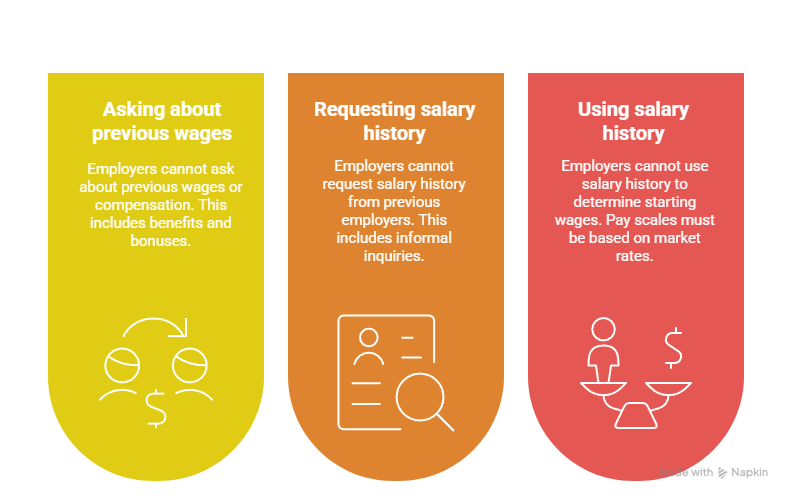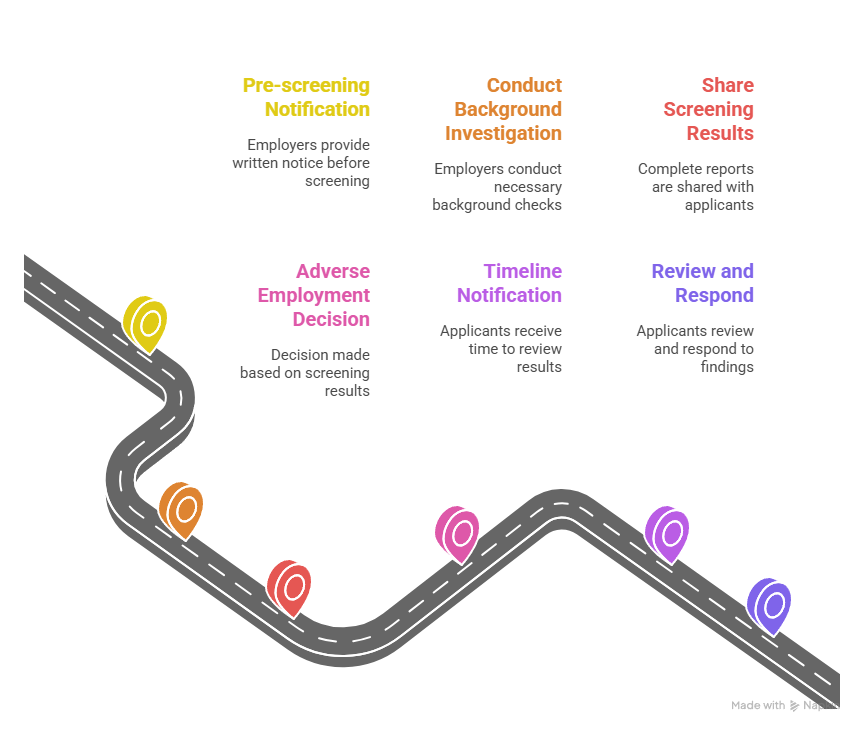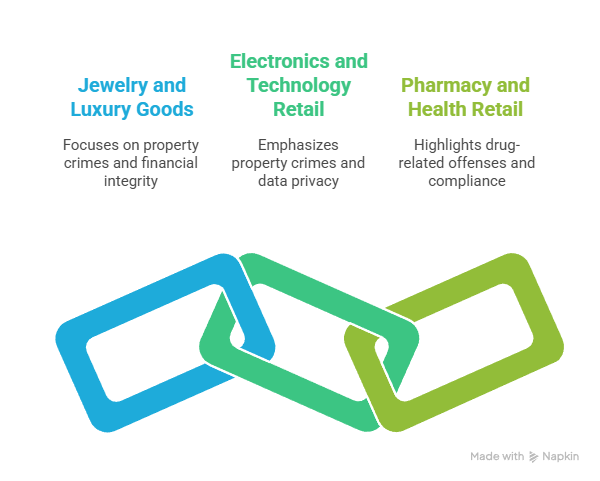California maintains some of the strictest retail background check laws in the nation, requiring employers to follow "ban the box" regulations, salary history restrictions, and specific timing requirements for criminal history inquiries. Understanding these complex regulations is essential for both job seekers and employers navigating the Golden State's retail employment landscape.
Key Takeaways
- California's Fair Chance Act prohibits retail employers from asking about criminal history until after a conditional job offer is made.
- Employers cannot inquire about salary history during the hiring process, helping eliminate pay discrimination in retail positions.
- Background checks in California retail typically take 3-7 business days, with additional time required for multi-state searches.
- Certain criminal convictions older than seven years cannot be considered for most retail positions under state law.
- Cannabis-related convictions are largely prohibited from consideration due to California's cannabis legalization laws.
- Retail job seekers have specific rights to dispute inaccurate background check information and receive copies of reports used in hiring decisions.
Understanding California's Fair Chance Act in Retail
California's Fair Chance Act represents one of the most comprehensive ban the box retail laws in the United States. This legislation fundamentally changed how retailers can approach criminal background screening during their hiring process. The law applies to all California employers with five or more employees, making it particularly relevant for retail chains, department stores, and even smaller retail operations. Notably, enforcement has strengthened significantly since 2024, with increased penalties for violations.
Under these California retail hiring laws, employers cannot include questions about criminal history on job applications. They also cannot make any inquiries about an applicant's criminal background during initial interviews or screening processes. This "ban the box" approach ensures that qualified candidates aren't automatically eliminated based on past mistakes before employers can evaluate their qualifications and skills. Moreover, the law protects workers across all retail sectors, from luxury boutiques to discount chains.
The Fair Chance Act requires a specific sequence of events when conducting California criminal background checks of retail positions. Employers must first extend a conditional job offer before initiating any criminal history investigation. If the background check reveals information that might disqualify the candidate, employers must follow a detailed notification and assessment process that considers factors like the nature of the offense, time elapsed, and job relevance. Additionally, recent 2024 amendments expanded protections for individuals with mental health-related criminal histories.
Timeline Requirements for Background Check Processing
California retail background check laws don't specify maximum processing times, but industry standards typically range from three to seven business days in 2025. County-level searches usually complete within 24-48 hours, while statewide California searches may take 3-5 business days. Multi-state background checks can extend the timeline to 7-10 business days, particularly for candidates with employment history in multiple states.
| Processing Type | Standard Timeline | Factors Affecting Speed |
| County Search | 24-48 hours | Court digitization levels |
| California Statewide | 3-5 business days | Holiday schedules, volume |
| Multi-State Search | 7-10 business days | Interstate data sharing |
| Federal Database | 1-2 business days | Government processing times |
Recent technological improvements have streamlined many aspects of California criminal background checks retail processing. However, employers must still allow adequate time for the full assessment process, including candidate response periods.
Prohibited Inquiries and Protected Information Categories
California retail employers face significant restrictions on what information they can request and consider during background screening. These California retail background check laws aim to balance employer safety concerns with fair employment opportunities for individuals with criminal histories. Furthermore, 2025 updates have expanded protections for various demographic groups and offense categories.
Salary History Restrictions:

- Cannot ask about previous wages or compensation: Employers are prohibited from requesting any salary information from current or former positions, including benefits and bonuses. This protection extends to all forms of compensation discussion during interviews. Violations can result in significant penalties and discrimination claims.
- Cannot request salary history from previous employers: Direct contact with former employers to obtain wage information is strictly forbidden under California law. This includes informal inquiries or attempts to gather compensation data through third-party sources. The restriction applies even when candidates voluntarily offer salary information.
- Cannot use salary history to determine starting wages: Even if salary information becomes available through other means, employers cannot factor it into compensation decisions. Pay scales must be based on market rates, internal equity, and job-related factors only. This ensures fair compensation practices across all retail positions.
Recent enforcement actions have targeted major retail chains for salary history violations. Consequently, compliance training has become essential for HR teams statewide.
Cannabis Laws and Retail Employment Impact
California's cannabis legalization has significantly impacted retail background check practices, particularly for positions in cannabis retail establishments and traditional retail businesses. The state's cannabis laws create specific protections for individuals with certain marijuana-related criminal histories while establishing new compliance requirements for cannabis retailers. Recent 2025 legislative updates have further clarified these protections and expanded expungement opportunities.
Traditional retail employers cannot consider most cannabis-related convictions that would no longer be illegal under current California law. This includes possession charges, cultivation for personal use, and other activities now legal for adults over 21. However, sales to minors, driving under the influence, and other serious cannabis-related offenses may still be considered relevant for certain retail positions. Additionally, federal law considerations may apply for positions involving interstate commerce or federal contracts.
Cannabis retail establishments face unique California retail hiring laws that require additional background screening for employees handling cannabis products. These positions require state licensing and more comprehensive criminal history reviews, though the same fair chance principles apply to the initial hiring process. Cannabis retailers must balance compliance with state cannabis regulations while following standard employment discrimination protections. Moreover, local municipality requirements may impose additional screening obligations for cannabis retail workers.
Compliance Requirements and Assessment Procedures
Mandatory Documentation and Record-Keeping
California retail background check laws impose specific compliance obligations that employers must follow to avoid legal penalties and discrimination claims. Understanding these requirements is crucial for maintaining lawful hiring practices in the state's complex regulatory environment. Recent audit increases by state agencies have made documentation more critical than ever for retail employers.
Retail employers must establish written policies documenting their compliance with California criminal background checks retail regulations. These policies should outline the conditional offer process, notification procedures, and assessment criteria used when potentially disqualifying information appears on background reports. Regular training for hiring managers and HR personnel ensures consistent application of these policies across all retail locations.
- Written background check policies
- Conditional offer documentation
- Individual assessment forms
- Training completion records
- Dispute resolution procedures
Documentation requirements have expanded significantly in 2025, with new mandates for tracking assessment outcomes and demographic impact analysis.
Individual Assessment Process Standards
The assessment process requires employers to consider several factors when evaluating criminal history information. These include the nature and gravity of the offense, the time elapsed since conviction, and the relationship between the criminal conduct and the specific retail position. Employers cannot apply blanket exclusion policies but must conduct individualized assessments for each candidate. Furthermore, recent court decisions have emphasized the importance of considering rehabilitation evidence and character references.
| Assessment Factor | Consideration Weight | Documentation Required |
| Nature of Offense | High | Detailed offense analysis |
| Time Elapsed | Medium-High | Date calculations, timelines |
| Job Relevance | High | Position-specific risk assessment |
| Rehabilitation Evidence | Medium | Character references, certificates |
Standardized assessment forms help ensure consistent evaluation across all candidates and locations. These tools also provide necessary documentation for potential legal challenges or regulatory audits.
Job Seeker Rights and Legal Protections
Access Rights and Information Disclosure
California retail job seekers have comprehensive rights regarding background checks conducted during the hiring process. Under state law, applicants must receive copies of any background reports used in employment decisions, along with information about their rights to dispute inaccurate information. These protections ensure transparency in the screening process and provide recourse when errors occur. Additionally, 2025 amendments have strengthened notification requirements and expanded access rights for applicants.
Mandatory Disclosure Requirements:

- Pre-screening notification: Employers must provide written notice before conducting any background investigation, including specific disclosures about the screening company and applicant rights. This notification must be provided as a separate document, not embedded within employment applications. The disclosure must include contact information for both the employer and screening company.
- Post-screening results sharing: Complete copies of background reports must be provided to applicants when adverse employment decisions are made based on screening results. This includes not only criminal history but also credit checks, reference verifications, and other investigative components. Employers must also provide information about the applicant's right to dispute findings.
- Timeline notifications: Applicants must receive adequate time to review and respond to background check results before final employment decisions are made. The standard timeline is five business days, though some circumstances may require longer periods. This waiting period allows candidates to gather supporting documentation or provide context for reported information.
Dispute Resolution and Correction Procedures
The dispute process for California retail background checks involves several steps designed to protect job seekers from inaccurate information. Applicants can challenge incorrect data by contacting the background screening company directly and providing documentation supporting their dispute. Screening companies must investigate disputes within 30 days and remove or correct verified inaccuracies. Recent technological advances have streamlined this process, though thoroughness remains paramount.
During the dispute process, employers should pause their hiring decisions until resolution occurs. This protection prevents job seekers from losing opportunities due to temporary inaccuracies in their background reports. Legal precedents from 2024 have strengthened these protections, making employer compliance more strictly enforced.
- Identity verification errors
- Outdated conviction records
- Incomplete case dispositions
- Jurisdictional reporting mistakes
- Data entry inaccuracies
Industry-Specific Requirements and Special Considerations

Different retail sectors face varying requirements under California retail background check laws, depending on the nature of products sold and employee responsibilities. Understanding these sector-specific considerations helps both employers and job seekers navigate the complex regulatory landscape more effectively. Recent regulatory updates in 2025 have created new categories for certain retail positions, particularly those involving emerging technologies and digital commerce.
High-Security Retail Categories:

- Jewelry and luxury goods: Enhanced screening protocols focus on property-related convictions and financial crimes, with particular attention to theft, fraud, and robbery-related offenses. These positions often involve high-value merchandise requiring specialized trust considerations. Background checks may include credit history reviews when financially relevant to the position responsibilities.
- Electronics and technology retail: Screening emphasizes property crimes, intellectual property violations, and technology-related offenses that could impact merchandise security. Positions involving repair services or technical support may require additional certifications and background verification. Data privacy considerations have become increasingly important for these roles.
- Pharmacy and health retail: Federal and state drug-related offense screening requirements apply, along with healthcare-related background checks for certain positions. These roles often require professional licensing and ongoing compliance monitoring. Recent changes in controlled substance regulations have affected screening protocols significantly.
Financial responsibilities within retail positions also affect screening requirements under CA retail hiring laws. Employees handling significant cash amounts, processing credit transactions, or managing inventory may face additional scrutiny while still following conditional offer requirements. However, these enhanced screenings must maintain individual assessment standards and cannot rely on automatic disqualification criteria. Moreover, positions involving customer financial data may require specialized privacy and security clearances.
Recent Legal Updates and 2025 Changes
California retail background check laws continue evolving rapidly, with significant updates taking effect throughout 2024 and early 2025. These changes reflect ongoing efforts to balance public safety concerns with fair employment opportunities for individuals with criminal histories. Notably, enforcement mechanisms have strengthened considerably, with increased penalties for violations and expanded private rights of action for affected job seekers.
Legislative amendments in 2025 have expanded the scope of protected information under California ban the box retail regulations. Mental health-related arrests and convictions now receive enhanced protections, particularly for non-violent offenses. Additionally, juvenile record protections have been strengthened, with stricter limitations on when such information can be considered for employment decisions. These changes reflect growing recognition of rehabilitation and second-chance employment principles.
Regulatory enforcement has also intensified significantly since late 2024. The California Department of Fair Employment and Housing has launched targeted compliance audits focusing on retail employers, particularly large chains with multiple locations. These audits examine not only policy compliance but also actual implementation and consistency across different hiring managers and locations. Penalties for violations can now reach $10,000 per incident, making compliance more financially critical than ever before.
Best Practices for Compliance and Implementation
Policy Development and Training Programs
Effective compliance with California criminal background checks retail requirements demands comprehensive policy development and ongoing training initiatives. Successful retail employers invest significantly in creating detailed procedures that address every aspect of the hiring process, from initial job postings through final employment decisions. These policies must be regularly updated to reflect changing legal requirements and enforcement priorities.
Training programs should cover all personnel involved in hiring decisions, including store managers, HR representatives, and corporate recruiting teams. Regular refresher training ensures consistent application of policies across all locations and positions. Documentation of training completion provides important legal protection and demonstrates good faith compliance efforts.
- Policy review and update schedules
- Training curriculum development
- Documentation and record-keeping systems
- Audit and compliance monitoring procedures
- Legal consultation and review processes
Recent compliance audits have revealed that policy existence alone is insufficient without proper implementation and monitoring systems.
Technology Solutions and Automation Tools
Modern background check compliance increasingly relies on technology solutions that automate key processes while ensuring legal compliance. These systems can track conditional offers, manage notification timelines, and document individual assessments consistently across all hiring decisions. However, technology cannot replace human judgment in the individual assessment process required by California law.
Automated systems help ensure that all required notifications are provided on schedule and that assessment documentation meets legal standards. They also provide valuable data for monitoring compliance trends and identifying potential problem areas before they result in legal challenges. Integration with existing HR systems streamlines the process while maintaining necessary documentation trails.
| Technology Feature | Compliance Benefit | Implementation Consideration |
| Automated Notifications | Consistent timing compliance | Customization for different positions |
| Assessment Documentation | Standardized legal compliance | Training for proper system use |
| Reporting and Analytics | Trend monitoring and audit preparation | Privacy and data security requirements |
Technology investments have proven cost-effective for most retail employers, particularly when compared to potential legal penalties and litigation costs.
Conclusion
California retail background check laws create a comprehensive framework designed to balance employer safety concerns with fair employment opportunities for individuals with criminal histories. The state's Fair Chance Act, salary history restrictions, and cannabis-related protections represent some of the most progressive employment laws in the nation, with 2025 updates further strengthening worker protections. Job seekers benefit from significant protections against discrimination, while employers must navigate complex compliance requirements to maintain lawful hiring practices. Understanding these regulations is essential for anyone involved in California's retail employment market, whether as a job seeker, employer, or HR professional. Staying current with evolving interpretations and enforcement of these laws helps ensure successful navigation of the Golden State's retail employment landscape in 2025 and beyond.
Frequently Asked Questions
How long do California retail background checks typically take?
Most California retail background checks take 3-7 business days to complete. County-level searches finish within 24-48 hours, while statewide searches may take 3-5 days. Multi-state background checks can extend the timeline to 7-10 business days.
Can California retail employers ask about criminal history on job applications?
No, California's Fair Chance Act prohibits retail employers from asking about criminal history on job applications or during initial interviews. Employers can only inquire about criminal background after making a conditional job offer.
What criminal convictions can California retail employers consider?
California retail employers can generally only consider convictions within the past seven years that are directly related to the job duties. Cannabis-related offenses that are no longer illegal under state law cannot be considered.
Are California retail workers protected from salary history inquiries?
Yes, California law prohibits employers from asking about previous salary or compensation history. Employers must provide pay scale information when requested by applicants.
Can California retail job seekers dispute inaccurate background check information?
Yes, job seekers have the right to dispute inaccurate background check information directly with screening companies. They must receive copies of background reports used in hiring decisions and can request corrections within 30 days.
Do California cannabis retail positions have different background check requirements?
Yes, cannabis retail positions require state licensing and more comprehensive background screening due to regulatory requirements. However, the same fair chance hiring process and anti-discrimination protections still apply.
Additional Resources
- California Department of Fair Employment and Housing - Fair Chance Act Guidelines
https://www.dfeh.ca.gov/fairchanceact/ - California Labor Commissioner's Office - Salary History Ban Information
https://www.dir.ca.gov/dlse/SB1001.htm - Federal Trade Commission - Background Check Rights
https://www.consumer.ftc.gov/articles/0157-background-checks - California Cannabis Industry Association - Employment Guidelines
https://www.cacannabisindustry.org/employment - Society for Human Resource Management - California Employment Law Updates
https://www.shrm.org/resourcesandtools/legal-and-compliance/state-and-local-updates/pages/california.aspx
Still have questions?
Get in touch with our team today for a personalized demo and discover how our tailored volume pricing and packages can drive results for your business!
How useful was this page?*
Note: your comments are anonymous. We use them to improve the website. Do not include any personal details.
Visit our FCRA Compliance Tool or leave a message here if you need a response.
From the blog Explore the GCheck Content Hub

How Long Does a Background Check Take? A Complete 2025 Guide
13 Dec, 2023 • 14 min read
The Ultimate Background Check Guide
13 Dec, 2023 • 4 min read
The Ultimate Guide to Employment Background Checks
13 Dec, 2023 • 10 min readThe information provided in this article is for general informational and educational purposes only and should not be construed as legal advice or a substitute for consultation with qualified legal counsel. While we strive to ensure accuracy, employment screening laws and regulations—including but not limited to the Fair Credit Reporting Act (FCRA), Equal Employment Opportunity Commission (EEOC) guidelines, state and local ban-the-box laws, industry-specific requirements, and other applicable federal, state, and local statutes—are subject to frequent changes, varying interpretations, and jurisdiction-specific applications that may affect their implementation in your organization. Employers and screening decision-makers are solely responsible for ensuring their background check policies, procedures, and practices comply with all applicable laws and regulations relevant to their specific industry, location, and circumstances. We strongly recommend consulting with qualified employment law attorneys and compliance professionals before making hiring, tenant screening, or other decisions based on background check information.

